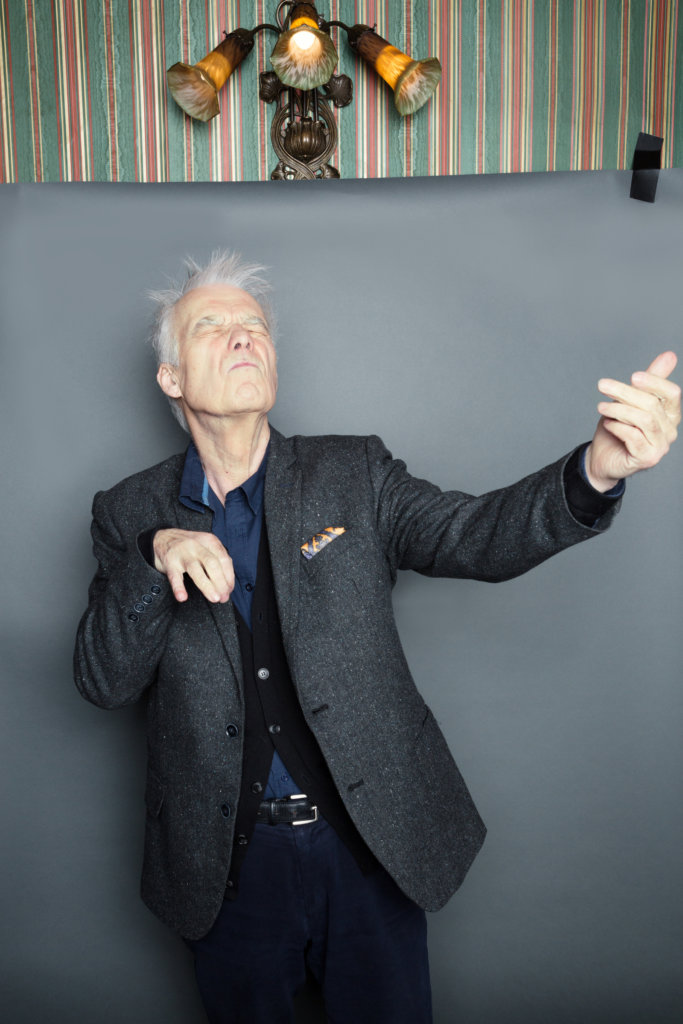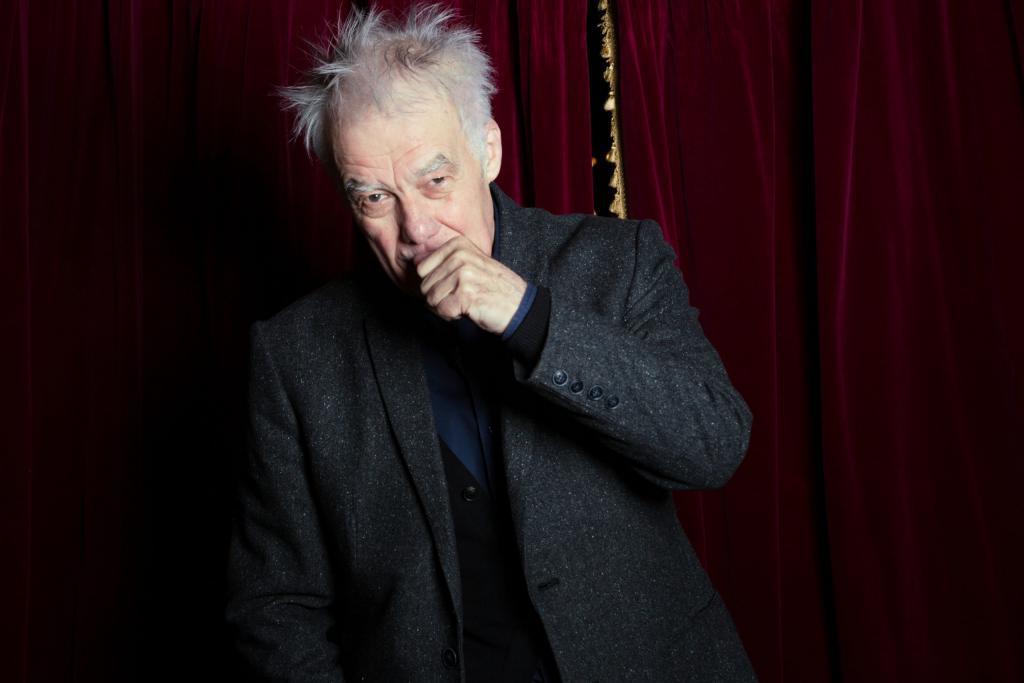Stories told in a portrait – Jan Kanty Pawluśkiewicz
On April 27, 2017, as part of the photo series “Stories told in a portrait,” we realized in Krakow a portrait session of one of the most famous film and entertainment music composers in Poland, Jan Kanty Pawluśkiewicz.




The session accompanied the meeting of Piotr Skrzynecki’s memoirs on the 20th anniversary of his death. During the meeting at his monument in front of the entrance to the Vis-à-Vis cafe on the Main Square (funded by Zbigniew Preisner), Friends from “Piwnica pod Baranami” performed the song “Lilies of the valley, lilacs or pet” written just after his departure (Jan Kanty Pawluśkiewicz – music, vocal; Jan Nowicki – words, vocal; Grzegorz Turnau – vocal; Elżbieta Towarnicka – soprano).
The session took place near Vis-à-Vis in a mobile photo studio at Cafe Europejska Restaurant in Krakow.
Organization of the session: Monika Muracka.
We especially thank the manager Elżbieta Towarnicka Wiktor Czajkowski for the support in taking photos.
Biography
Jan Kanty Pawluśkiewicz – a composer of theater, film and song music, as well as a painter specializing in gel-art technique. He was born in Nowy Targ. A graduate of the secondary music school and the Faculty of Architecture of the Cracow University of Technology. Co-founder of the cabaret Anawa (1966), which in time turned into a music band with vocalist Marek Grechuta and numerous instrumentalists, among whom were: Marek Jackowski (guitar), Jacek Ostaszewski (flute) and Zbigniew Wodecki (violin). In 1972 Andrzej Zaucha became the vocalist, and after reactivating the band in 1974, Marek Grechuta again.
The performers of the songs of Jan Kante Pawluśkiewicz were, among others: Hanna Banaszak, Sebastian Karpiel-Bułecka, Renata Przemyk, Janusz Radek, Maryla Rodowicz, Beata Rybotycka, Ryszard Rynkowski, Irena Santor, Justyna Steczkowska, Anna Szałapak, Grzegorz Turnau and Zbigniew Wodecki.
A composer of many musical forms, including: the musical “Crazy Locomotive” (premiere in the tent of the STU Theater at Rydla Street in Krakow, 1977), the opera “Kur zapiał” (premiere of the STU Theater in Krakow, 1984), the concert “Apimondia Mater” ( premiere at the Congress Hall in Warsaw, 1987), “Ribbed Opera” (premiere of the Stu Theater and People’s Theater in Krakow, 1991), oratorio “Nieszpory Ludźmierskie” (premiere at the Basilica of the Assumption of the Virgin Mary in Ludźmierz, 1992), the symphonic poem “Harp Papusza “(premiere in Błonia Krakowskie, 1994), concert” Amat vita “(on the occasion of the opening of the dam on the Dunajec, 1998), oratorio” Ogrod Jozafata “(premiere at the church of Saint Anna in Zabrze, 2002), piano concert” Leaf ring ” (premiere at the Polish Radio Concert Studio in Krakow, 2005), the mystery “The Lord Has Crossed this Earth” (premiere on the Main Square in Krakow, 2005), oratorio “Venice stories about hell and paradise” (premiere in Co-Cathedral Basilica in Stalowa Wola, 2008), oratory “Joy of Mercy” (premiere in the Basilica of Our Lady of Perpetual Help and Saint. Maria Magdalena in Poznań, 2009) or the clarinet concert ‘Karossa / Carossa’ (2013).
In larger forms, she collaborates with the outstanding Polish soprano Elżbieta Towarnicka, as well as with Andrzej Biegun, Gwendolyn Bradley, Magdalena Idzik, Marzena Michałowska, Andrej Skhurhan, Iwona Socha and Bożena Zawiślak-Dolny.
His compositions were conducted by class conductors such as Ewa Strusińska, Mirosław Błaszczyk, Sławomir Chrzanowski, Rafał Jacek Delekta, Wojciech Michniewski, and presented abroad in Canada (Chicago – the church of the Holy Trinity in 1999 and Toronto – the cathedral of St. Michael in 1996), Lithuania (Vilnius, on the River Wilia in 1998, as well as in the Church of the Holy Spirit in 2016), Portugal (Lisbon, EXPO in 1998), Ukraine (Lviv, Cathedral Basilica of the Assumption of the Virgin Mary in 2015) and the USA (New York, St. Bartholomew’s Cathedral in 1999). Soon his compositions will be presented for the first time in Grodno, Belarus.
Composing film music and long-term cooperation with Tomasz Zygadło [“Rebus” (1977), “Ćma” (1980), “Odwet” (1982)] and Kazimierz Kutz [“Returned” (1994), ” Colonel Kwiatkowski “(1995)]. He also created music for the films of Feliks Falk [“Wodzirej” (1977), “Szansa” (1979, “Idol” (1984), “Hero of the Year” (1986)], Agnieszka Holland [“Fever” (1980), “Lonely Woman” “(1981)], Krzysztof Kieślowski [” A Short Work Day “(1981)], Marta Meszaros [” Daughters of Happiness “(1999),” Little Vilma “(2000)], Joanna Kos-Krauze and Krzysztof Krauze [” Papusza ” (2013) – award for the best music during the 38th Gdynia Film Festival, the award of the Polish Film Academy – Eagle 2014 and the award “Jańcio Wodnik” for music at the National Film Festival “Prowincjonalia” in Września in 2014]. Member of the European Film Academy Winner of the Short Film Festival in Krakow (1975), the Television Work Festival (1992) and the Polish Feature Film Festival in Gdynia (1994).
He was nominated four times for the Polish phonographic industry award Fryderyk (in the composer category of 1995 and the album of 1994, 1996, 2003). In 2005, he was awarded the Cracow Laurel of the 21st Century, an award granted to outstanding personalities who combine science, art and business environments. He is an Honorary Shepherd of Podhale (1992), Honorary Citizen of the Polkowice Commune (2007) and the City of Nowy Targ (2008), as well as the Mountain Ambassador (2011).
He is currently developing the art of gel-art, of which he is the creator. This technique involves filling images with individual gel dots. Until now, his works have been presented at exhibitions in Brussels, Slovakia, Hungary and Italy. He lives in Krakow.
Polskie Radio SA in the years 2013-2015 issued an 11-disc anthology of Jan Kante Pawluśkiewicz.
The artist’s work can be followed at: pawluskiewicz.pl.
By sending a link to the official music video of the song “Lilies of the valley, lilac or pet” (CLICK),, I invite you to view portraits of other Artists taken that day in Krakow: